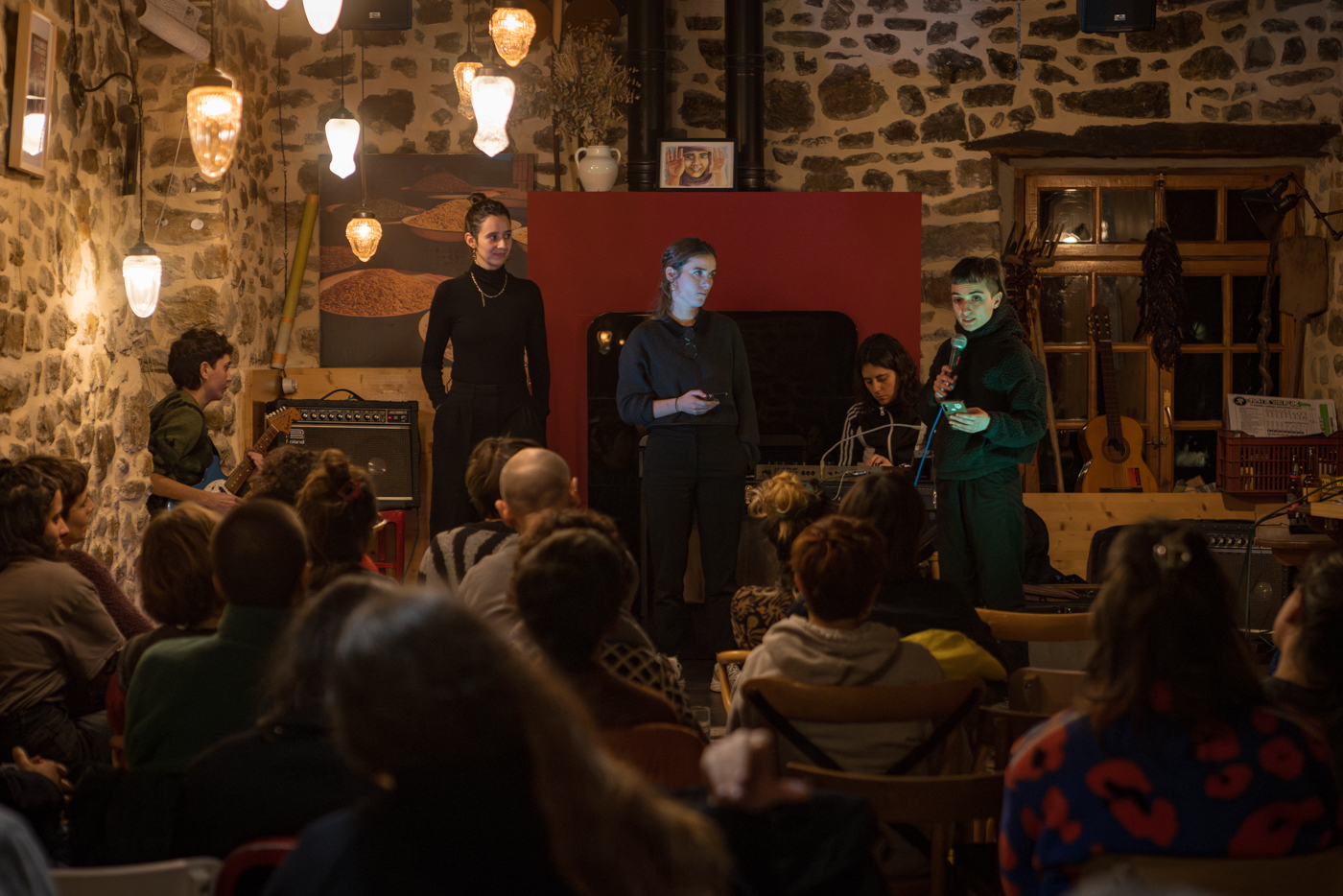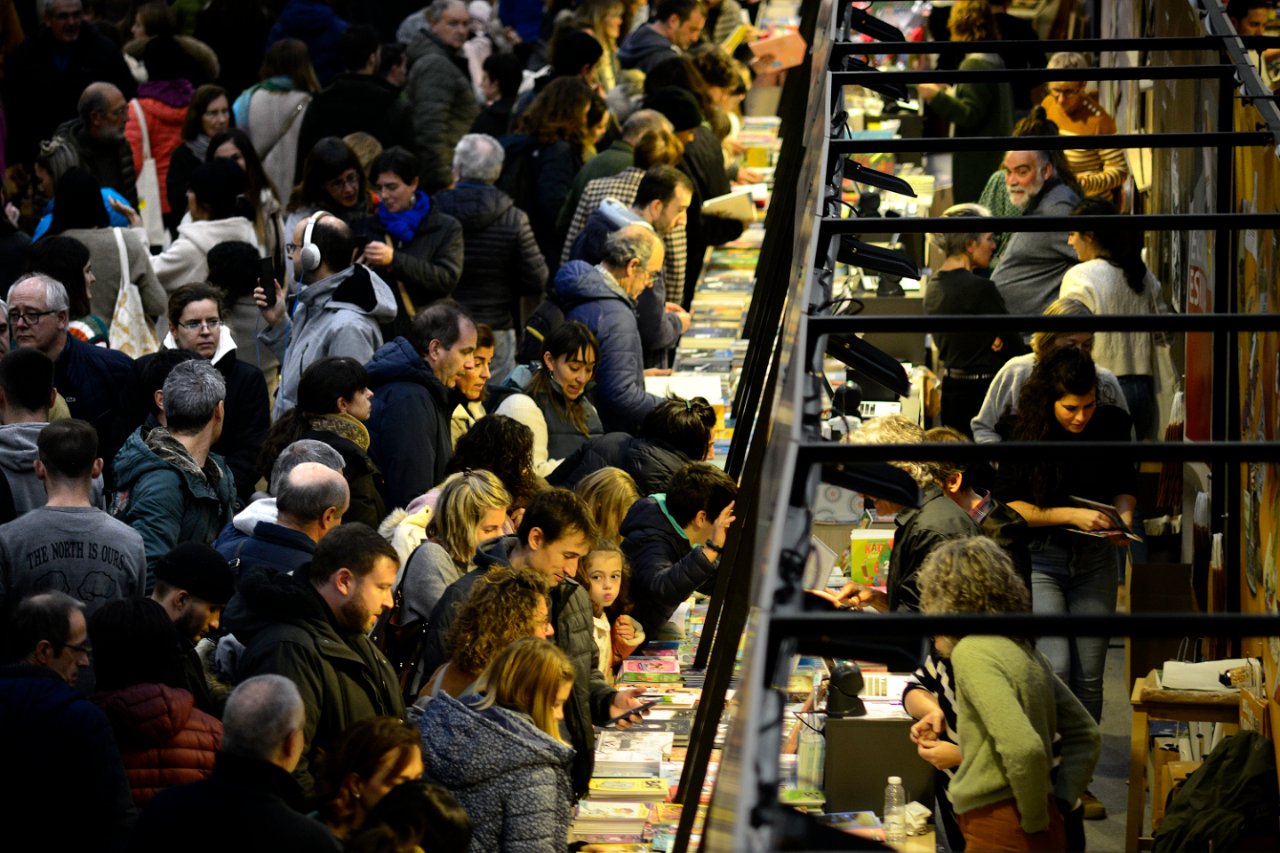“Sometimes we lack courage in the Basque literature”
- The stories of the book Amez de Goiatz Labandibarren (Oiartzun, 1985) have the same thematic axis, maternity, but the reader will find many edges of this experience in this collection of stories that has been published in the editorial Alberdania in February of this year. We talked to the writer in Oiartzun, where Labandi was born.

The text that opens the book draws attention: you have connected the first tomato from the vegetable garden and maternity. How does this story come about?
[Laughs] It's true that it's not something that's expected, and that's why the first narrative can be a little bit to break schemes. This story has a real starting point: about four years ago we started making the orchard, we put the tomatoes in and when I saw the first one I felt the emotion of the Christ. A crew, who was a mother, I said, “Now I understand what it feels like to see the first ultrasound.” For him the comment was a bit irritating, because I compared his daughter to a tomato, but -- for me it was a wonderful moment, and from there I wrote the story. In other books, I haven't, but in this, I had to make a conscious decision when I started writing, I knew I wanted to write a series of narratives around mothers, and I made this story from the beginning.
Besides this story based on a real fact, Amez shows the kind of people that many of us can meet.
All stories have a specific starting point and many have a real starting point, although they are all fictional. I was also looking for that, showing that in this real life there's no one perfect, and that's why no one is worse. But yes, in those stories are my mother, my grandmother, my friends -- real people, even if they appear very makeup and take as a base a small event of those people.
Although motherhood appears in all stories, it appears articulated with very different axes. The story of a mother who has killed her son, but also of racism.
I said I'm talking about the most universal issue in this book, because everyone has a recognized mother or not. And there's a superstition that says that when a woman is a mother, she's just a mother. But this woman is still a person, with her hobbies, with her phobias... motherhood will be part of her being, but many other parts make up her. So it's impossible to write about a mother without talking about other things.
It is precisely in this history that there is also self-criticism of our society and of our stereotypes. As for motherhood, there are decades to say what is good and what is bad, but we have things around everything: what is acceptable, what good we are from here, that those from outside are not so good, but some are better... And in the end, they're a good excuse to look and reflect on society.
.jpg)
In the story Antonina you record the last moments of Rosa Luxembourg's life. What interested you in your life as a literary material?
When I read Women, Race and Class [Elkar, 2016] by Angela Davis, I saw how Luxembourg claimed the “birth strike.” That served me, I had never heard of myself, and I was already starting with this project. Then I read the prison letters to Sophie Liebknecht and started delving into his life. I knew him as a historical figure, but if Rosa Luxembourg had not claimed that birth strike, I would not have created that story. His thesis on this is very interesting, why a strike, what chain would be cut. It wasn't very successful even in their political circles, but if you think about it, what it was demanding is absolutely logical. In addition, Luxembourg was never a mother, it was a conscious decision for her to give up motherhood, a way also to talk about motherhood. More is being said today, but it still has its taboos.
She is not the only woman who has suffered political persecution in the book, another example is the story Missing. Have you wanted to tell how repression breaks your mother's identity, or how a woman renounces her maternal figure for militancy?
I would say it is something else: how that situation, political harassment, in this case to create a new identity that allows that woman, and to give up things that she wants to give up her previous life, including her daughter. Well, your daughter and all her personality. It is an absolutely fictional story, it is not based on a real story, but I find it interesting that possibility of repenting and that possibility of giving up, which we could not understand – and which is presented as something that is not understood in history as well.
"I'm talking in this book
about the most universal issue because everyone has a mother, recognized or not."
Something similar could be said of the decision of the protagonist of the story Perfect: after having a child, plan to become pregnant with a second child and abort.
I think there's a lot of talk about the option of being a mother and the possibility of having an abortion, but it seems that abortion is a juvenile thing, if you've been left unintentionally and it's not yet time in your life. Or as something that happens after a drama, as if it were just the decision taken by someone who has been raped. And in the story, it arises whether the one who has a child is doomed to be more. She says she's a good mother, but she doesn't want so many children, and I think those things aren't yet accepted.
Despite these kinds of issues, the book is full of irony and humor.
Irony is a very useful tool to emerge our misery in a more subtle way, without hurting anyone so much, without being violent. And also to laugh, because then a lot of people look reflected. So I use it a lot in my writings. Many times I have noticed that when you have to tell something bad about being a mother, you have a lot of guilt, as if you were making a sacrilegious, because in theory it should be “the best of your life,” and that’s as if you were betraying. And since the book's been published, people have told me it's been seen in some stories. OK. Actually, the essence of stories in general is not particularly dramatic, they're little details, they're things of everyday life. It has also allowed me to ironize.
Can fiction give more freedom to address this issue than essay books?
I would say yes, although at the end of the book I mention other books like Against the Children, by Chilean writer Lina Meruane: it's a lot of fun, laugh -- and it's an essay. I do not believe that the trial involves absolute seriousness. The same, more so than that, is that so far not much has been written on this subject. It is also something surprising to me: many mothers appear in the literature, but are not usually protagonists, but mothers of protagonists, at least in the Basque literature. I believe that Arantxa Urretabizkaia was the first to have a mother protagonist with Zergatik panpox [Hordago, 1979], and it is no coincidence. All the writers write about an issue that interests us and it is curious that so far it has not been looked at very much. And, for example, Amek de Katixa Agirre does not have that mother look that appears in [Elkar, 2018], how he tries to understand what a “bad mother” can be, I think it is to be welcomed. I have been asked in more than one interview whether the issue is fashionable now, and I say no, it is not fashionable, but it has not been written so far. And now, in the last five years, four or five books have been published, and it seems like I don't know what's going on. But in Basque literature there are a thousand other themes that are repeated and not called fashion. And, by the way, I find it curious how little has been written in the Basque literature about parents, for example, that Basque writers have rarely looked at paternity.
"I find it strange how little has been written in the Basque literature about parents, for example; that Basque writers have rarely looked at paternity"
Another striking story in the book: Monster. Agripina tells the story first person, but it looks like a very contemporary Agripina.
Yes, it also makes contemporary references, Freud, etc. I don't know how I got to him. I think at first I started with Oedipus because of the famous syndrome of my mother's lovers, but it didn't work for me, and I started studying, looking, and I got to Neron and Agripiña. I was very happy with the result of this story, but the curious thing is that the role that has played between the historical figures of mothers and especially stepmothers has not been very positive in general.
In the stories Hondartza garaia and Labeak, mothers use their children in dangerous activities, in the case of the second story in a war action. It seems to me today that they would be a bit taboo.
Labeak's starting point is a literal story of the book Svetlana Aleksievitxen Gerra has no female face [Elkar, 2017]. Many mothers appear in the book and the stories that are narrated are often very shocking; and when I read in particular, I was broke with the schemes: to imagine that a seven-year-old was sent to put a bomb, and that in addition the narrative was made exalting that, which is not the mother, but another woman from her group. “How am I going to try to understand this action?” was mostly my exercise. Today, it seems unimaginable something that no one would forgive. It's true that when you're in a borderline situation, nobody knows how it would react, but that was the exercise, trying to understand it.
.jpg)
And the high beach, I'm going to tell you now, because you can count it because the grandmother has died: it was done by my grandmother, she used her children in the car of smuggling. The starting point was very real in this case: here the exercise was to go back a few years, when you have to see that we do not know how we will react and what a person is capable of doing.
Among the most developed stories, there are others that go right into the background. One of them is teeth, which tells the reactions that occur after a child's accident at school.
I believe that today everything ends in a complaint. We do everything right and the others are the ones who always do it wrong. And we don't recognize that sometimes things go through something and that we have to take responsibility. It is true that it is a very short story. Also in the previous book [That was it, Alberdania, 2019] I wrote the very short stories, and I usually went to write later, but in some cases, for example, what I wanted to tell was so accurate, it couldn't last longer. I don't make a lot of descriptions, for example, because I normally don't care how things are physically. If it doesn't matter in history, I don't care if everyone imagines what they want. Sometimes I think you don't have to count everything too much. I think the reader is smart, he has the ability to understand things without me having to explain everything.
To listen to mature stations or songs (Elkar, 2013) since his first book, what do you think has changed your way of writing?
I feel like I write better now, with more confidence. The first book was the first for everything, with its good and bad things, and I owe it a lot, although now I feel it from me in the light years. But, I don't know how to explain this -- I'll tell you that in the ikastola we were taught that I had more ways to write, that I was going more to that typical home-solution, and now I do less and less. I think more and more: “How do I want to tell this?” or “maybe this is not a normal way to tell, but it doesn’t matter to me” and tests it. I dare more with form, but then there is always something else, that is, how many dare with the new forms in the Basque literature. I believe that sometimes we lack courage in the Basque literature to everyone, I do not say that it is a problem for publishers or writers; I think the reader is the one who has the least guilt, because in the end he chooses between what is there. We touch a lot on things like “the novel is a novel,” and I am very interested in hybrid books, but I don’t think we do many of those here.
Joan Tartas (Sohüta, 1610 - date of unknown death) is not one of the most famous writers in the history of our letters and yet we discover good things in this “mendre piece” whose title, let us admit it from the beginning, is probably not the most commercial of the titles... [+]

















ilbeltza-(1).jpg)




